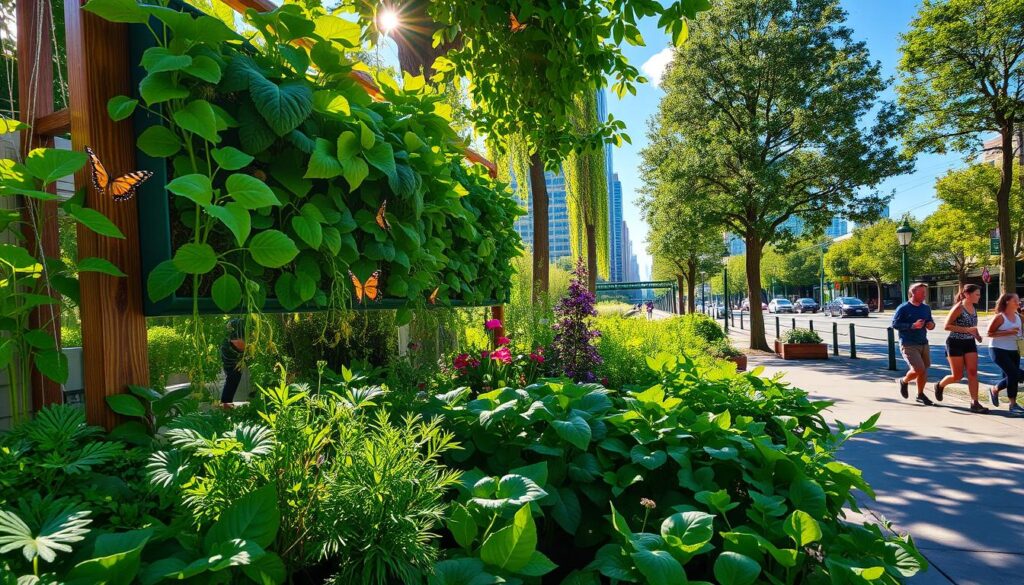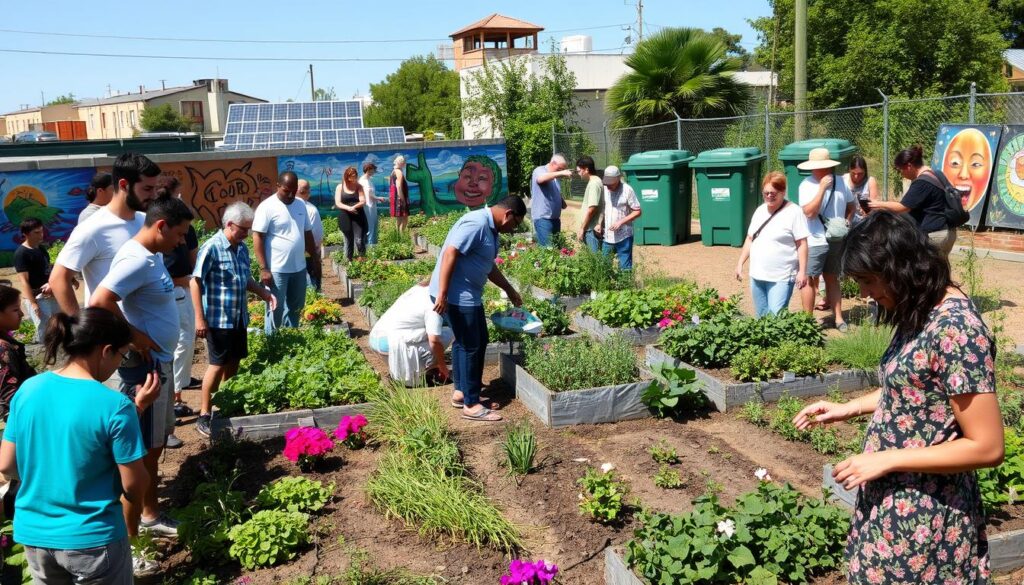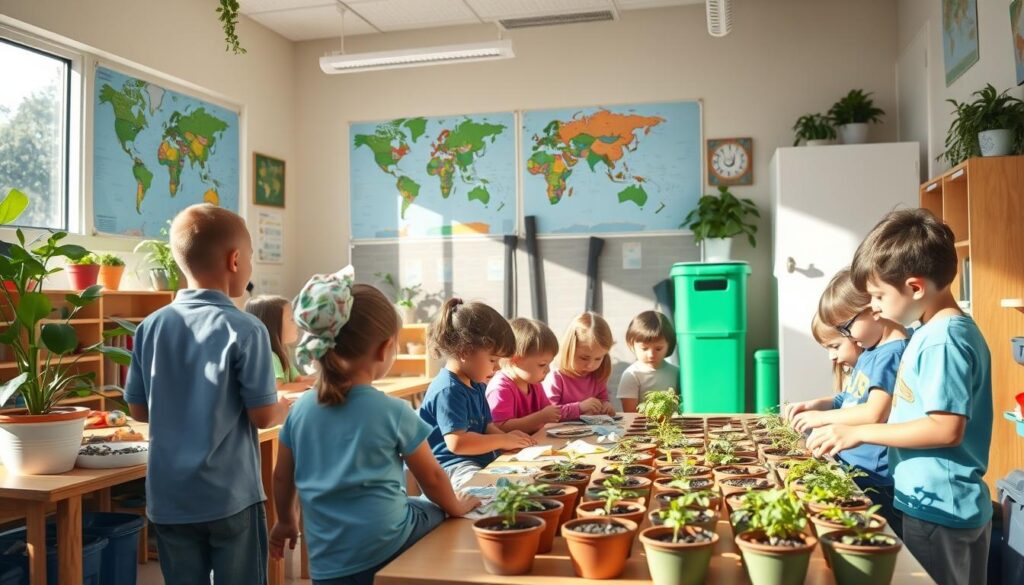עכשיו יותר מתמיד, חיים ירוקים עומדים כתקווה שלנו לקיימות. על ידי בחירה באופן חיים שמטפח את הסביבה, אנו עושים הבדל גדול. הבחירות הללו עוזרות להפחית את השפעתנו הסביבתית, לחסוך באנרגיה, ולתמוך במגוון הטבע.
חיוני שנפעל עכשיו כדי לחיות חיים ירוקים. זה לא רק עוזר לכדור הארץ אלא גם בונה מקומות בריאים לחיים. וזה מבטיח עולם טוב יותר לדור הבא.
מסקנות מרכזיות
- חיים ירוקים עוזרים להפחתת הצפין האקולוגי שלנו.
- התעמלות בקיימות סביבתית יוצרת קהילות בריאות יותר.
- אימוץ אופן חיים אקולוגי תומך בדורות הבאים.
- פעולות שנעשות היום משפיעות על בריאותה הכללית של הכדור.
- שינויים קטנים בהרגלי יום-יום עשויים להוביל לתועלות סביבתיות משמעותיות.
חשיבותם של חיים ירוקים
חיים ירוקים הם על ידי הבנת קיימות. זה שיווי מאוד נחוץ לטובת הרווחתנו ושל הכדור. כל בחירה שאנו עושים היום משפיעה
דורות העתיד. על ידי חיים ידידותיים לסביבה, אנו נהנים גם אנחנו וגם האדמה.
הבנת הקיימות
קיימות אומרת לשמור על הסביבה, החברה והכלכלה בהרמוניה. זה על פי בחירות שמפחיתות את הגלגל האקולוגי שלנו. על ידי בחירת שיטות קיימות, אנו מגן על עתיד הכדור שלנו.
השפעות הסביבתיות של בחירותינו
הבחירות היומיומיות שלנו משפיעות באופן משמעותי על הסביבה. בין אם זה המוצרים שאנו קונים או איך אנו ניהלים פסולת, הכל חשוב. על ידי בחירת אפשרויות ידידותיות לסביבה כמו חומרים ביודגרדבלים, אנו יכולים להפחית את הזיהום ולחסוך במשאבים. אירועי קהילה לעיתים תומכים בתובנות חיוניות אלו, עודפים על הרגלים טובות.
| בחירה | השפעה סביבתית | אפשרות ידידותית לסביבה |
|---|---|---|
| שקיות פלסטיק | פסולת לא ביודגרדבילית | שקיות בד נטולות נפח |
| אופנה מהירה | צריכת משאבים יתר | מותגי בגדים קיימים |
| סכו"ם חד פעמי | פסולת פלסטית | כלי אוכל קומפוסטיים |
| בקבוקי מים לשימוש חד פעמי | פסולת מים ופלסטיק | בקבוקי מים נטולי נפח |
שלבים מעשיים לאימוץ חיים ירוקים
כדי לקבל חיים ירוקים, עלינו לקחת צעדים שיעזרו לכדור הארץ. על ידי שימוש באסטרטגיות פשוטות, אנו יכולים לעשות הבדל גדול. כך נוכל לתרום לקיימות בכל יום.
הפחתה, שימוש מחדש, ומחזור
הרעיון של הפחתה, שימוש מחדש, ומחזור מדריך אותנו להפחתת פסולת. מתחילים על ידי רכישת פחות—בוחרים מוצרים שאין להם הרבה אריזות. משתמשים בפריטים יותר מפעם אחת כמו שקיות קניות, בקבוקי מים, וקופסאות. כאשר אנו ממחזרים דברים כמו נייר, זכוכית, ופלסטיק, אנו שומרים על פסולת מחוץ למחמדים. זה עוזר לכדור הארץ.
יעילות אנרגטית בבית
הפיכת הבתים שלנו ליותר יעילים מבחינת אנרגיה חשובה. זה עוזר להפחית כמה אנרגיה אנו משתמשים. רכישת מכשירים ENERGY STAR יכולה לחסוך המון אנרגיה. בידוד הבית שלך שומר על הטמפרטורה בדיוק. זה אומר שאין צורך לחמם או לקרר אותו כל כך הרבה. כיבוי האורות ונטילת החשמל ממכשירים כאשר אנו לא משתמשים בהם גם חוסך אנרגיה.
אפשרויות תחבורה ירוקות
בחירת שיטות תחבורה ירוקות יכולה לגרום להפחתת גזים מזיקים. למרחקים קצרים, נסו לרכוב על אופניים או ללכת. זה טוב לסביבה וגם לבריאות שלכם. שימוש בתחבורה ציבורית עוזר להפחתת מספר הרכבים בכביש. רכבים חשמליים הם אפשרות נוספת טובה. הם טובים יותר לסביבה. הבחירות הללו עוזרות לנו לעבוד לעבר עתיד ירוק.
| שלב | יתרונות | דוגמאות |
|---|---|---|
| הפחתה | ממזערת פסולת | קנייה בכמות גדולה |
| שימוש מחדש | שומר על משאבים | שימוש בשקי בד |
| מחזור | מפחית פסולת בטיחות | תוכניות מחזור ברחוב |
| יעילות אנרגטית | מפחית חשבונות אנרגיה | שדרוג למכשירי ENERGY STAR |
| תחבורה ירוקה | מפחיתה את רמת הפחמן | שימוש בתחבורה ציבורית |
חיים ירוקים והבריאות שלך
חיים ירוקים מועילים לבריאותך בצורה משמעותית. זה מרגיש לך טוב, גם בגוף וגם בנפש. הטבע והחיים המתמשכים מעלים את בריאותך בדרכים גדולות. מרחבים טבעיים יכולים להופיע לך כמותיקים ופחות מופחדים.
להיות פעילים בטבע הוא מרכזי לבריאות מלאה. זה לא רק כיף; זה חיוני.
הקשר בין הטבע והרווחת
מחקרים מראים שזמן בחוץ טוב בשבילך. זה מוריד סטרס ועוזר לך להירגע ולהתמקד יותר טוב. אנשים שחיים ירוק מתבררים מנטלית ומתישים רגשית יותר.
להיות קרובים לטבע גורם לרבים להרגיש שהם שייכים. זה חשוב לבריאות כללית.
יתרונות המזון האורגני
המזון האורגני טוב יותר לבריאותך. יש בו פחות חומרי גיהוץ ודברים נזיקים. אלה שאוכלים אורגני מרגישים יותר אנרגטיים וחיים.
חקלאות אורגנית טובה גם לכדור הארץ. זה תומך בסביבה מגוונת ובאדמה בריאה. לבחירה באורגני יש משמעות גם באכילה טובה ובחיים מתמשכים.

| ניבוי בריאות | מזון רגיל | מזון אורגני |
|---|---|---|
| מאגר רעלים | רמות גבוהות קיימות | מינימליות עד ללא |
| השפעה על מצב רוח | משתנה | שיפור במצב רוח |
| תוכן תזונתי | ייתכן שיהיה חסר סדר | לעיתים תזונה גבוהה יותר |
| השפעות סביבתיות | שיטות מזיקות | שיטות ידידותיות לסביבה |
יוזמות קהילתיות וחיים ירוקים
השתתפות בפרויקטים קהילתיים היא דרך חזקה לתמוך בחיים ירוקים. פעולות מקומיות קטנות יכולות ליצור שינוי גדול בכל העולם. הן עוזרות לשמור על מזון ולקדם חיים בריאים. קהילות בכל מקום רואות עכשיו את הערך שבעבודה משותפת. זה מראה כיצד קבוצות קטנות יכולות ליצור שינויים גדולים.
איך פעולות מקומיות יוצרות השפעה גלובלית
צעדים פשוטים כמו ימי ניקיון או התחלת תוכניות למחזור יכולים לגרום לאפקט רטט. כאשר אנשים מתאחדים למעשה טוב, הם לא רק מנקים את האזור שלהם אלא גם מעודדים אחרים. זה עשוי להוביל לשינויים גדולים שעוזרים לכדור הארץ, ומתמודדים עם נושאים כמו שינויי אקלים.
גני קהילה וחקלאות עירונית
גני קהילה חיוניים לצמיחת הערים. הם מהפכים מרחבים ריקים למקורות של מזון טרי ויופי טבעי. הם גם מפגישים אנשים ומעודדים טיפוח של הסביבה. זה מראה כיצד חקלאות בקנה מידה קטן בערים עשויה להוביל לבריאות קהילתית טובה יותר.
הצטרפות לקבוצות תומכות בסביבה
השתתפות בקבוצות שמאבקות בשביל הסביבה נותנת לאנשים כוח לעשות שינויים אמיתיים. קבוצות כמו Sierra Club עוזרות לאנשים להשתתף בפרויקטים ירוקים. ביחד, הם עובדים על הפחתת זיהום והצלת חיות וצמחיה. הצטרפות לקבוצות אלו עושה את המאבק על עולם ירוק ובריא יותר קל יותר.

חיים ירוקים לדורות העתיד
ללמד את הצעירים על קיימות היא חיונית להגנת כדור הארץ שלנו. מאמץ זה עוזר לגדל אנשים המודעים לסביבה. זה גם מוביל לפיתוח התנהגויות ידידותיות לסביבה שמועילות לסביבה הגלובלית שלנו. בתי ספר ובתים יכולים לשחק תפקיד מרכזי על ידי העברת מידע חיוני על קיימות.
ללמד ילדים על קיימות
בתי ספר מתחילים ללמד על קיימות דרך התכניות הלימודיות שלהם. הם מקימים תוכניות על אקוסיסטמות, שמירה, ואנרגיה מתחדשת. פעילויות בחוץ, כמו ביקורים בשמורות טבע, מביאות את השיעורים לחיים. כאשר ילדים דנים בנושא של קיימות בבית, זה מחזק את מה שלמדו. לראות מבוגרים חיים בצורה ידידותית לסביבה מחזק את המחויבות שלהם לעשות אותו הדבר.
יצירת מורשת של מודעות לסביבה
כדי להשאיר מורשת מודעות לסביבה, משפחות חייבות להיות פעילות. הן יכולות לעורר את הילדים בגינון, מיחזור, וחיסכון במשאבים. זה מלמד לילדים את חשיבות האחריות הסביבתית ומעצימם. ארגונים כמו הפדרציה הלאומית לחי וצמח עוזרים להדריך הורים ומורים. להפוך את הקיימות לחלק מהחיים היומיומיים עוזר לוודא את עתיד כדור הארץ שלנו.

חיים ירוקים: טיפים ידידותיים לתקציב
לחיות בצורה ירוקה לא צריך לעלות הרבה. עם יצירתיות וידע, תוכל למצוא טיפים ידידותיים לתקציב. הטיפים האלה משפרים את סגנון החיים הידידותי לסביבה שלך מבלי לשבור את הבנק.
מוצרים ידידותיים לסביבה ויעילים מבחינת עלות
בחירת מוצרים ידידותיים לסביבה יכולה לחסוך כסף ולהציל את הכדור הארץ. ישנן אפשרויות זולות שעוזרות לצרכנים לבחור טוב יותר. כמה מהבחירות המובילות כוללות:
- שקי קניות רב פעמיים – הם מחליפים פלסטיק חד פעמי ונמשכים יותר.
- חומרי ניקוי ביודגרדבילים – מנקים אלה חוסכים בכימיקלים נזיקים.
- מוצרי נייר ממוחזר – השימוש בהם עוזר להפחתת הפסולת.
- מכשירים חסכוניים באנרגיה – מכשירים אלה משתמשים בפחות אנרגיה וחוסכים כסף.
חיסכון בכסף עם שמירה על אנרגיה
שמירה על אנרגיה מורידה את חשבונות החשמל שלך. הנה דרכים קלות לחסוך:
- תאורת LED – משתמשת בעד 80% פחות חשמל מנורות מסורתיות.
- נתבי חשמל חכמים – הם מנתקים חשמל כאשר אינם בשימוש.
- תחזוקה רגילה למערכת ה-HVAC שלך מגבירה את היעילות שלה.
- סגירת חלונות ודלתות משמרת את הבית שלך מבידוד ומאפשרת חיסכון באנרגיה.
השימוש בטיפים אלה יכול להפוך את אופנת החיים שלך לידידותית לסביבה. הם עוזרים להפחית את ההשפעה הסביבתית שלך. בנוסף, הם מציעים חיסכון על ידי חיסכון באנרגיה בצורה יעילה.
| סוג מוצר | עלות ראשית | חסכון שנתי | תועלת סביבתית |
|---|---|---|---|
| נורות LED | $10 לנורה | $20 | מפחית את פליטות פחמן דו חמצני |
| מצבר חכם | $25 | $50 | מפחית את הבזבוז בצריכת אנרגיה |
| שקיות רב פעמיות | $15 לחמישה | $30 | מפחית את זיהום הפלסטיק |
מסקנה
קיבלת חיים ירוקים היא מפתח לעתיד קיימות. האימוץ של אופן חיים ידידותי לסביבה הוא חשוב מאוד. המאמצים האישיים שלנו יכולים לגרום לשינויים גדולים כאשר משולבים.
הפעלת בחירות קיימות, כמו בחירת מכשירים יעילי אנרגיה, עוזרת לכדור הארץ שלנו. כל צעד לעבר חיים ירוקים לא רק עוזר לכדור הארץ אלא גם טוב עבורנו. על ידי עבודה משותפת ותמיכה במאמצים מקומיים, אנו עושים הבדל גדול.
ללמד דורות העתיד על קיימות היא חיונית. שינויים קטנים באופן החיים שלנו יכולים ליצור השפעה שמחזיקה. עכשיו הזמן לחיות ירוק. כל מאמץ שאנו עושים מוביל לעתיד קיימות.










